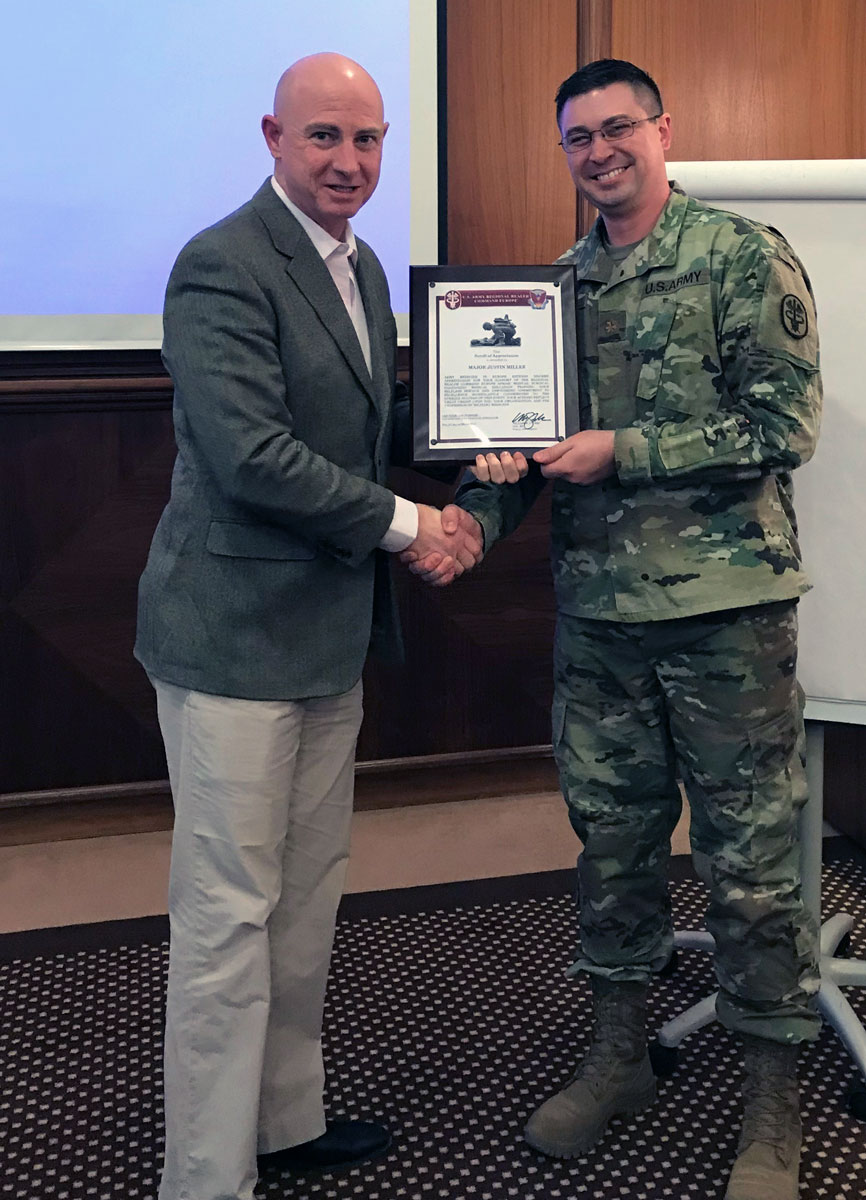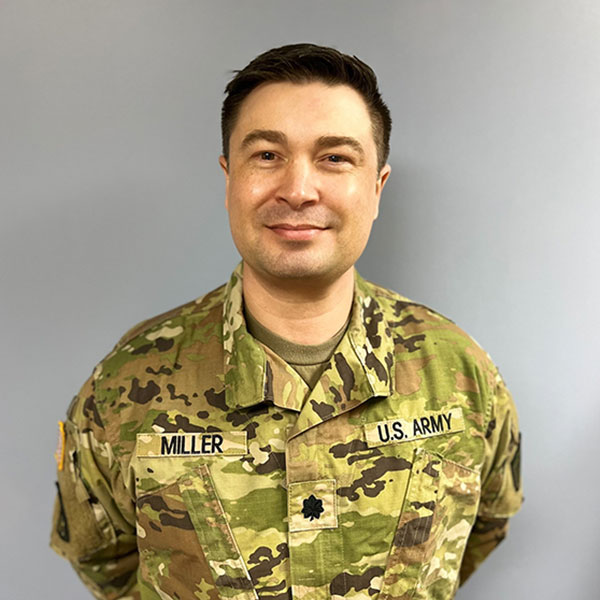Lieutenant Colonel Justin Miller’s approach to life has centered around one simple quote from Nelson Henderson: “The true meaning of life is to plant trees, under whose shade you do not expect to sit.” These words have guided him through almost 17 years in the Army Nurse Corps, and these words inspired him to pursue his Ph.D. in Nursing at UAB.
“When looking for ideas on how to solve problems and make the (health care) system better, there are still a lot of unknowns,” said the 41-year-old North Dakota native. “With my understanding of the military and the trauma system within the military, I have a lot of knowledge that could help make that system better, especially for nurses, and I don’t want to keep that information to myself. I want to be able to share it with others.”
Miller never dreamed of becoming a nurse. He happened upon nursing by chance, but that one moment in time sparked a love that has continued to grow over the years.
“There was no rhyme or reason for my decision to pursue nursing other than I had no idea what I wanted to do,” he laughed. “I can take you back to the exact moment. I was walking with a friend back home and she told me she started taking this nursing class, and she suggested I take it with her.”
Miller was a theater major at the time, but he went to the class, really enjoyed it and changed his major to nursing.
His introduction to the Army happened in a similar fashion. About two years into college, he needed to find a way to support himself and pay for school. The Reserved Officer Training Corps offered a scholarship that only required four years of active service upon graduation. Miller said he did not know much about the Army and his plan was to put in his four years and then pursue something else.
“Anyone you talk to in the military will probably tell you the same thing,” he said. “But I found people that I like working with and are great friends, and I stuck around to get the schooling and travel and be around those friendships.”
And travel he did. After graduating with his Bachelor of Science in Nursing from the University of North Dakota, Miller’s first duty station was at Joint Base Lewis-McChord in Washington where he was a bed nurse in Med-Surg. He also completed the Critical Care Course training to become an ICU nurse while in Washington. His next station was in Hawaii where he worked as a flight nurse and a bedside critical care nurse at Tripler Army Medical Center. Then he deployed to Camp Bucca in Iraq in 2008 where he helped care for detainees, many of whom were burn casualties. It was in Iraq that Miller discovered his interest in burn patients, and that interest only grew as he continued gaining more experience through his military career.
What’s does Veterans Day mean to me?
“I usually take the day to reflect on the patients I’ve take care of who have died or their injury severely impacted their quality of life. It’s a day of remembrance for me, not just for my patients, but those who came before. Veterans Day is about being part of the family that is military. … It’s about taking care of that family, and thinking about the ones you still have and the ones who have gone.”
Next, he was at the Institute of Surgical Research in San Antonio, Texas, where he worked as a burn nurse and burn flight nurse, and soon became the head nurse of the unit there, but he decided he could be doing more. He applied to the Army’s Long-Term Health Education and Training program and returned to school to receive his Doctorate of Nursing Practice as a Clinical Nurse Specialist.
“Being in a specialty care unit (at the Institute of Surgical Research) that only took care of trauma and burn patients, I was able to really focus and found my love in that patient population,” Miller said. “I found it very fulfilling. All burn patients are trauma patients and I absolutely love trauma. The initial resuscitation and getting the patients through their initial injury is work I like doing. Burn patients are also sick for a long time … so you really get to know them and their families.”
There is also technology involved in burn care, and Miller was fortunate to be at a facility that developed numerous programs, techniques and tools to help care for patients, giving him an opportunity to see the science side of things.
Despite the excitement of technology and the challenges that come with each case, it always comes back to the patients for Miller.
“You work so, so hard and it’s absolutely devastating when someone doesn’t make it,” he said. “But then you have those patients that you transfer to the step-down unit and they’re still unable to walk, but then they come back to visit in a year or so and they walk in by themselves with their families -- that’s what it’s about.”
While Miller never thought about becoming a clinical nurse specialist, he realized he could be a better clinician by gaining more expertise. He was also surrounded by “amazing nurse specialists,” and it was their mentorship, guidance and encouragement that gave him the motivation to go back to school for his DNP.
After earning his DNP in 2016, he transferred to Landstuhl Regional Medical Center in Germany where he worked as a Clinical Nurse Specialist and helped trained medical personnel in Kuwait, Poland, Germany, Norway, Ukraine and France. He also presented at several international conferences on trauma specific to prolonged field care. Then, in 2019, he transferred to the Army Trauma Training Detachment in Miami where he was a professor of nursing trauma and taught forward surgical resuscitative teams how to care for patients in a deployed setting. It was in 2019 that he also decided to pursue his Ph.D. in nursing at UAB.
“After my DNP, I had no interest in going back to school,” Miller said. “I could do everything I wanted to do for the rest of my life with a DNP.”
 However, many of Miller’s decisions in life have been in part because of mentorship and role models, and the same was true for his decision to pursue his Ph.D. He had the opportunity to meet and get to know several Army officers with nursing doctorate degrees from UAB, and those experiences gave him a better idea of who he wanted to be as a nurse. His mentor, Dr. Pat Patrician, is also a retired Army colonel.
However, many of Miller’s decisions in life have been in part because of mentorship and role models, and the same was true for his decision to pursue his Ph.D. He had the opportunity to meet and get to know several Army officers with nursing doctorate degrees from UAB, and those experiences gave him a better idea of who he wanted to be as a nurse. His mentor, Dr. Pat Patrician, is also a retired Army colonel.
“They really showed me how a nurse researcher in the Army is able to influence decisions being made and effect both our nurses and the patients we care for,” he said. “I wanted to be part of that.”
Miller transferred back to his first duty station -- Joint Base Lewis-McChord – a few months ago. He is now the Chief of Evidence-Based Practice and Chief Clinical Nurse Specialist at the Madigan Army Medical Center in Tacoma, Washington, as well as the Deputy Chief for the Center for Nursing Science and Clinical Inquiry. His role with patients now falls more under consultant work. He assists medical teams when they have trouble determining a plan of care for a patient and arranges training for new equipment when needed. Much of his job is assessing the nursing care provided, forecasting future nursing care needs and then determining the training required in order to provide that future care.
“I really do enjoy what I do now, but I miss that hands-on patient care,” Miller said. “I still make it a point to round four to five times a day and speak to the nurses, families and the patients, if they are awake enough to speak. I am influencing care throughout the whole hospital so even though I might not have that direct connection with the patient and their families, I am influencing the care they receive. My focus now is on developing these new nurses and making sure they know how to provide competent care for our patients and the populations we care for here.”
Despite his intense workload, Miller is determined to finish his Ph.D. in nursing. With 2.5 years into the program as a part-time student, he has chosen the three-paper option for his dissertation. His first paper is an integrated literature review of patient outcomes who received either whole blood or blood component products in a trauma environment.
“The research is pretty clear on outcomes up to 30 days post-injury, but there’s very little research for intermediate or long-term outcomes, which is 30 days to 6 months post-injury,” Miller said.
For his second paper, Miller will do an in situ study in the UAB Trauma Center where he will simulate the use of whole blood transfusions compared to blood component transfusions and measure nurses physical and cognitive workload associated with each.
Finally, his last paper will look at the differences in outcomes in the Department of Defense Trauma Registry for patients injured in any of the wars since 2007 and analyze those patients who received massive blood transfusions.
“I’m very interested in trauma systems and the running of those by using big data known as health services research. It’s how you approach research in order to answer the questions of which systems work best for patients to have the best outcomes,” he said. “It’s all about outcomes for me.”
He anticipates finishing in 2023, which is about the same time he is eligible to retire from the Army so his future can go either way. He has not decided whether he will continue in the Army lane or pursue academia, although his long-term goal is to be at a research-intensive university. If he stays with the Army, Miller said he would transition from his Clinical Nurse Specialist role to a research role where his focus will be full-time research.
“I don’t think I will ever get away from the bedside completely. I just like it too much, and I think you need to be in that environment in order to figure out the questions to ask,” he said. “If you don’t see the practice, you don’t know what to question.”
